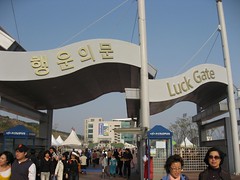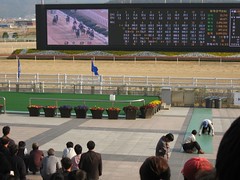We were out with a couple of friends Saturday afternoon, when one of them suggested on the spur of the moment that we go to the Busan horse racing track to watch a race. What he didn't realise was while there were races on Friday and Sunday, Saturday was an off-day, where the only action was happening in Seoul. But this in no way put off the hardy Korean gambler, who were still out in force when we got there.
Now I come to think about it, while there are sometimes so many shops, restaurants, bars and amenities of all kinds in Busan you wonder where people find the space to live, I've never actually knowingly seen a betting shop, which conversely are fairly prevalent on the streets of the UK. Perhaps Korean gamblers are happier to congregate at the racecourse, or perhaps this is the only place such betting is allowed - I'm aware, for example, that Koreans aren't allowed into most casinos in Seoul (although I understand that one is open to them) - which suggests the laws are more draconian here, even if Go-Stop and associated betting represents a major subculture. Actually, I've watched a Korean movie where the police were regularly busting underground Go-Stop dens which only adds to this impression.
The 'Busan Gyeongnam Racecourse Park' ('부산경남경마공원') was built in 2005, so the main stand seemed fairly new, but the major surprise was the interior, which bore more than a passing resemblance to a large airport lounge, complete with screens, seats and severely haggard looks. Alongside the more traditional various betting counters were ATM-like automated betting machines, and enough security to run a small police state, which it distinctly began to feel like as I tried to move around the building to take photos, while evidently being followed. James Bond always made it look easy blending into a crowd, even when he was the only foreigner in an Asian country, but let me tell you, the reality is somewhat different. Maybe I should dye my hair black.
If some of the people inside had a look in their eyes like Jack Nicholson after a hard night, those outside in the seating facing the track were even more hard-core, because this was where the chain-smokers - sometimes with their children - came to watch the races on the big screen... when their heads weren't buried in their form-books. It may be the first place in Korea I felt like nobody noticed me.
My companions decided to bet on a race but I declined; fifty hours of stock-market trading every week is more than enough gambling for me. It seems they placed an 'exacta' bet, where one horse is chosen to win and one of several others is chosen to come second. Inexplicably they won, multiplying their stake by a factor of five. I thought our nearby resident professional gamblers would register some form of visibly negative reaction to this, but they were far too busy plunging their heads back into their form-books for the next race.
Gambling on horses is obviously a big business here, but even so I was mildly surprised to discover a classroom in the stand where a staff member stood at the front waving a pointer at the various odds and statistics, while the trainee gamblers took notes or stared at the changing numbers as though they were in a trance. Well, I guess I know that feeling.
The Korean Racing Authority (English tagline: 'Life&Love with KRA'), also seems to have put some thought into those bored spouses that they can't convince to part with their money, and their children - there's a small park in the middle of the course, a large slide on a slope behind the stand, pony rides and various stalls and activities taking place nearby.
One problem with the racecourse though is its location near Gimhae Airport in the uncharted south-western backwaters of Busan. The large estuary separating the bulk of the city from this satellite area means that traffic is funnelled there and back via a couple of bridges, which was fine mid-afternoon, but as people returned from their trips to the outlying reaches and beyond, the road network turns into one long jam. It took us around twenty minutes to travel out to the racecourse, and about one and a half hours to return at a considerably slower speed.
Given the apparent popularity of the location, I was mildly surprised not to have heard of it before. Evidently it doesn't feature prominently in any official promotional material for Busan I've seen. But there is an English blog entitled Horse Racing in Korea, which I think surprised me even more. Wikipedia gives the impression that while horse racing may not be widely watched in Korea, it is quickly growing in popularity.







No comments:
Post a Comment